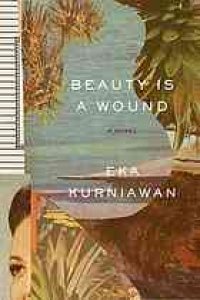
Ebook: Beauty is a wound
Author: Kurniawan Eka, Tucker Annie
- Tags: Families -- Fiction. Mothers and daughters -- Fiction. Prostitutes -- Fiction. Speculative fiction. Indonesia -- Fiction. Indonesia -- History -- Fiction. Families. Mothers and daughters. Prostitutes. Indonesia.
- Series: New Directions paperbook NDP1313
- Year: 2015
- Publisher: New Directions Publishing
- City: Array
- Language: English, Indonesian
- epub
"The English-language debut of Indonesia's greatest young novelist, Eka Kurniawan: "without a doubt the most original, imaginatively profound, and elegant writer of fiction in Indonesia today: its brightest and most unexpected meteorite" (Benedict Anderson). One afternoon on a weekend in May, Dewi Ayu rose from her grave after being dead for twenty-one years. So begins Beauty Is a Wound, an epic, sweeping, Read more...
Abstract: "The English-language debut of Indonesia's greatest young novelist, Eka Kurniawan: "without a doubt the most original, imaginatively profound, and elegant writer of fiction in Indonesia today: its brightest and most unexpected meteorite" (Benedict Anderson). One afternoon on a weekend in May, Dewi Ayu rose from her grave after being dead for twenty-one years. So begins Beauty Is a Wound, an epic, sweeping, compulsively readable novel, combining history, satire, family tragedy, legend, humor, and romance in a sweeping polyphony. It is also a highly political book. Revolving around the beautiful Indo prostitute Dewi Ayu and her four daughters, various plotlines incorporate incest, murder, bestiality, rape, insanity, monstrosity, and the often vengeful undead. Kurniawan's gleefully grotesque hyperbole functions as a scathing critique of his young nation's troubled past. The rapacious offhand greed of colonialism; the chaotic struggle for independence; the 1965 mass murders of perhaps a million "Communists," and the three decades of Suharto's despotic rule that followed. The bravura resilience on display here makes Beauty Is a Wound a luscious yet astringent product of the art blossoming since the fall of Suharto. Kurniawan's distinctive West Javanese voice will be entirely new to American readers, and its local sources (the all night shadow puppet plays, with their bawdy wit and epic scope; the famous local folk tales) will astonish, but Kurniawan draws as well on his favorite world writers, Melville, Gogol, Hamsun, and Marquez"